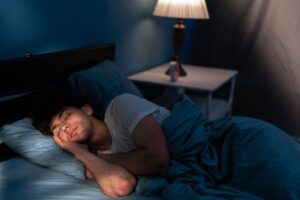
As an adult, bedwetting can be an extremely concerning symptom of a number of medical conditions. What many people don’t know is that this symptom is a common sign of sleep apnea, which is a health issue that is often accompanied by frequently waking up to urinate throughout the night. Continue reading to assess what could be causing nighttime urination and what type of treatment can address your concern.
What is Nocturia & How is It Related to Sleep Apnea?
Nocturia is the clinical term for what most people would call frequent nighttime urination, or if it occurs while you’re still asleep, bedwetting. This condition can be caused by other medical conditions, but studies have found an association between obstructive sleep apnea and nocturia in adults as well.
Researchers have examined this connection more closely to find out why OSA can lead to nighttime urination, and one of the hypotheses is that low oxygen intake due to airway obstruction can put additional stress on the bladder.
When you don’t receive enough oxygen due to airway obstruction, your pituitary gland may not be as effective at releasing certain hormones, like the antidiuretic hormone, which signals the body to absorb more water, keeping it from going to the bladder. If this hormone isn’t secreted at the rate it normally is, you could notice an uptick in nighttime urination due to your body producing more urea.
Other Signs of Sleep Apnea
In addition to nighttime urination, some other symptoms of sleep apnea include:
- Chronic, loud snoring
- Waking up gasping for air
- Daytime fatigue
- Migraines
- Worsening chronic health conditions
If you notice any of these in addition to bedwetting, either in children or adults, it’s best to schedule an appointment with a sleep apnea specialist. They will be able to conduct a sleep study and diagnose whether or not your symptoms are the result of obstructive sleep apnea.
What Treatments are Available for Sleep Apnea?
The good news is that there are a number of treatments available for obstructive sleep apnea, all of which could help minimize instances of nighttime urination and bedwetting. One of the most recommended therapies is CPAP treatment, which is a small nose mask that keeps the airway open as you sleep by continuously administering air through it. If you’re not a good candidate for CPAP treatment because you’re a light sleeper or another reason, you may be a better candidate for oral appliance treatment. This involves using a customized mouthguard-like appliance to keep the airway open as you sleep.
Although bedwetting and nighttime urination can be embarrassing, it’s just your body letting you know that something isn’t working quite right, which is actually a good thing! This difference can let you know that it’s time to see a sleep dentist, and if you’re diagnosed with sleep apnea, lead to your symptoms getting treated!
About the Practice
At SleepMed Solutions, our team is comprised of every specialist you need to receive a diagnosis and treatment for sleep apnea, including our medical director, Dr. Sall, our sleep dentist, Dr. Thomas Bagley, and our Physician Assistant, Jack Bagley. If you’re experiencing frequent nighttime urination along with other symptoms of sleep apnea, our team can help you find the answers you’re looking for. Schedule a consultation today by visiting SleepMed Solutions’ website or call 336-907-7773.
